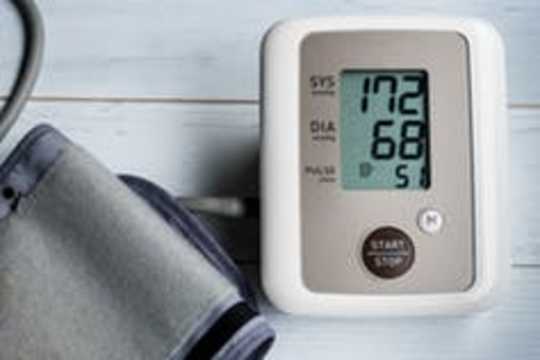
Taking a reading. Andrey_Popov/Shutterstock
More than 7m people in the UK have high blood pressure; it is a leading cause of cardiovascular disease and cardiovascular events such as heart attacks and strokes, associated with one in four deaths. As many as 5.6m people in the UK do not realise they have it as they feel fine, while others show signs such as shortness of breath, persistent headaches, blurred vision or nosebleeds. So, what is blood pressure and why is it so important?
Your heart is a pump, roughly the size of your fist. Contraction of the heart muscle generates a force, causing pressure to rise in your blood vessels, which drives the flow of blood around your body. This flow works continually to supply oxygen and nutrients to organs through your arteries and removes waste products through your veins too. The problems begin when the pressure becomes so high that it begins to cause damage to the blood vessels and increase the workload on the heart.
 A blood pressure gauge. Voraorn Ratanakorn/Shutterstock
A blood pressure gauge. Voraorn Ratanakorn/Shutterstock
To measure your blood pressure a cuff is wrapped around your upper arm and connected to an automatic device, but your doctor may prefer to use a stethoscope and sphygmomanometer. A normal blood pressure in the UK is around 120/70mmHg, measured in millimetres of mercury. The highest number is the systolic pressure, when your heart contracts to push blood through your arteries. The lower number is the diastolic pressure, when your heart relaxes. But what is considered a healthy range to be in can depend on where in the world you are – in the US, for example, blood pressure was considered to be high if it was over 140/90mmHg but in 2017, the threshold was changed to include readings over 130/80mmHg.
Get The Latest By Email
The effect of age
 Cross section of an artery, showing an atheroma (blockage) on the left. Jose Luis Calvo/Shutterstock
Cross section of an artery, showing an atheroma (blockage) on the left. Jose Luis Calvo/Shutterstock
As we get older, many people have an associated increase in blood pressure, clinically referred to as hypertension. Most of us know that as we age our skin loses its stretchy capability and we get wrinkles. Your blood vessels also age and lose their elasticity, which leads to what is often termed “stiffness” of your blood vessels. This is potentially exacerbated by an accumulation of fatty material in the wall of blood vessels over time, known as an atheroma. This accumulation builds up over years through a process known as atherosclerosis, where small lesions, originating in damaged areas of blood vessels develop into large plaques, which ultimately reduce the internal volume of the vessel internal and restricts blood flow.
This blockage can occur in any blood vessel leading to an acute or chronic problem. If located in the coronary artery, which supplies the heart muscle with oxygen – it will result in a heart attack or chest pain known as angina. However, a blockage of the carotid artery – an artery found in your neck – would reduce blood flow to your brain and cause a stroke.
High readings
In the UK, your blood pressure will be classified in a NHS clinic according to official NICE guidelines. A first reading of 140/90mmHg or higher, will result in a second measurement and a third measurement. If there are substantial differences, the lower reading is recorded. If this is 140/90mmHg or above you will be diagnosed with high blood pressure.
There are also different tiers of high blood pressure. NICE currently states that: “Stage 1 hypertension is where a clinical blood pressure is 140/90mmHg or higher,” whereas “Stage 2 hypertension is where a clinic blood pressure is 160/100mmHg or higher”. Those with “severe hypertension possess at clinic a systolic blood pressure [that] is 180mmHg or higher, or a diastolic blood pressure at 110mmHg or higher”.
However, the American College of Cardiology and the American Heart Association, the advisory body in the US, drastically reduced their thresholds for diagnosis; in the US, Stage 1 hypertension is classed as a systolic pressure of 130mmHg or over, and Stage 2 is over 140mmHg. Considering this adjustment, the US expect more than 46% of the adult population to have high blood pressure, and more specifically for those over the age of 45, the diagnosis is expected to triple in men and double in women.
Risk factors
The idea of lowering thresholds of high blood pressure in the UK has been mooted. The reason is that high blood pressure is a key factor for predicting your individual risk of a cardiovascular problem.
Some of these risk factors are non-modifiable such as your age, race, gender born, family history and genetics, however others are modifiable such as blood pressure, blood cholesterol, body-mass index (BMI) – calculated from your weight and height – and of course lifestyle choices such as diet, physical activity, smoking/vaping and alcohol consumption.

Lifestyle factors such as diet can impact your blood pressure. Sharif Pavlov/Shutterstock
A clinical study (nicknamed SPRINT – Systolic Blood Pressure Intervention Trial) took 9,361 people aged over 50 with at least one cardiovascular risk factor or with pre-existing kidney disease, and who used pharmaceutical drugs to lower blood pressure in accordance with new US guidelines.
SPRINT found a 25% relative reduction in the risk of death during the six year follow up among those people treated intensively to reach the 120mmHg target, compared with those treated to 140mmHg. This led to early termination of the study as it showed an obvious benefit to lowering resting blood pressure to 120mmHg or less, and gave a 30% lower relative risk of cardiovascular problems such as stroke or heart attacks on follow up.
As such there is a clear argument that to maintain a typical blood pressure in the UK (120/70mmHg) should be the target for us all.![]()
About the Authors
Sandra Jones, Senior Lecturer in Biomedical Science, University of Hull and Matthew Lancaster, Associate Professor in Biological Sciences, University of Leeds
This article is republished from The Conversation under a Creative Commons license. Read the original article.
books_health







